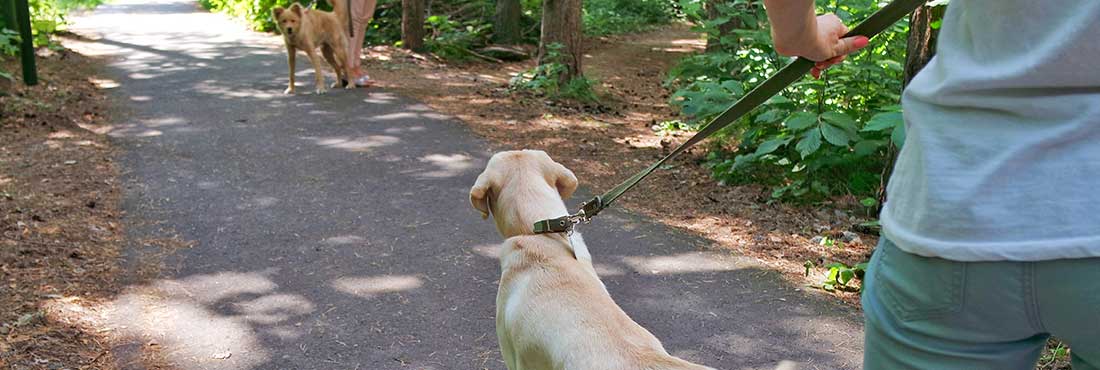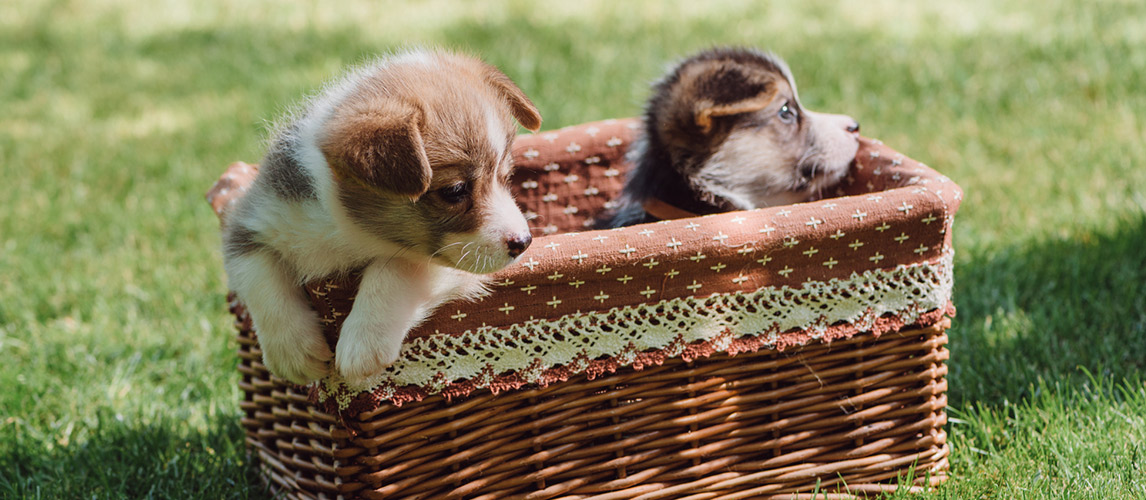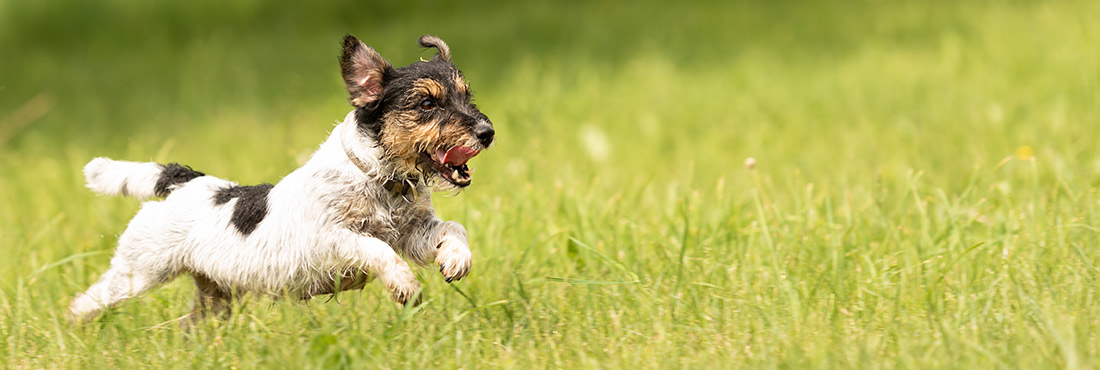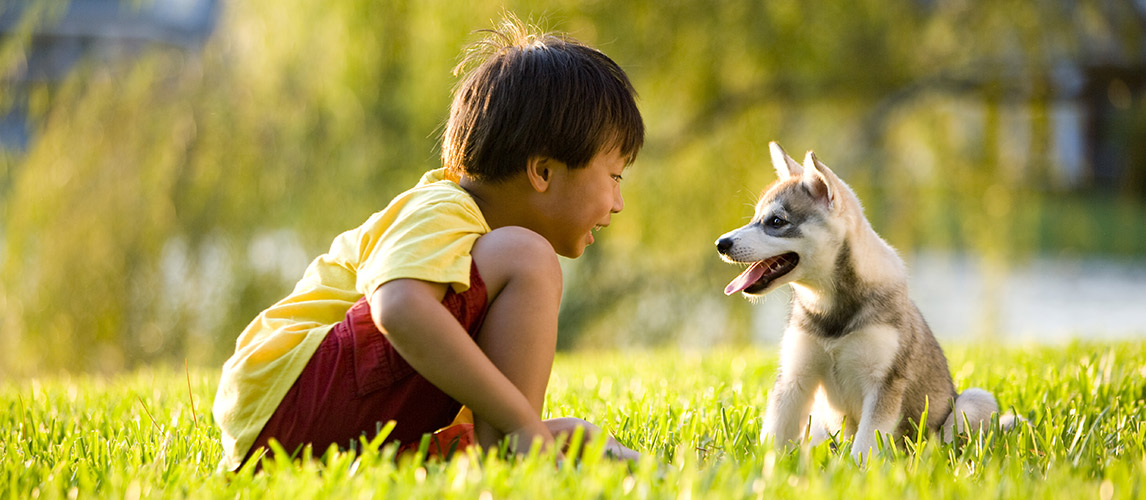The Golden Retriever breed is exceptionally friendly and well-behaved as a grown dog. However, this isn’t always the case, which means that you may find yourself with an unfriendly Golden Retriever.
It’s important to know that dogs are never aggressive without reason. When your pup acts negatively, you need to find out what will trigger aggression in them and why that trigger exists. Before you seek an animal behaviorist, spend some time trying to understand your dog and why they might be acting this way. Golden Retrievers aren’t one of the known dangerous breeds, after all.
Let’s start with identifying aggression in Golden Retrievers and what you can do to set your puppies straight if they show this type of behavior towards you or any other dog.
Are Golden Retrievers Aggressive Dogs?
As Golden Retrievers are known as one of the friendliest dog breeds, having an aggressive one is certainly out of the norm. Golden Retrievers are family dogs, much like their counterparts in the Labrador Retriever breed.
Like all dogs, there are times when your Golden Retriever pup may become an aggressive dog. These should be far, few between, and more likely when your dog is a puppy than an adult. If your Golden Retriever is showing more aggressive behavior as an adult, it’s possible that it is learned behavior triggered in response to something they’re seeing or hearing.
Remember that a mixed Golden Retriever breed will have different behavioral patterns to a regular Golden Retriever. All dog breeds are different.
Do you Have an Aggressive Golden Retriever?
The signs of an aggressive Golden Retriever are similar to any other dog breed. Dog owners will want to learn to recognize aggression signs when concerned about their dog’s behavior, but they should also know the common causes of the aggression. We’ve covered both here to give you an idea of what might cause aggressive behavior in a Golden Retriever and what that behavior could look like:
- Territorial aggression – snarling, barking, or even attacking other dogs or people touching items that the dog considers “theirs”. This behavior may also occur if other animals or people go near the dog’s “personal space”.
- Food aggression – similar aggressive behaviors to those seen in territorial aggression, the dog will become angry if another dog is near their food bowl and may even show aggression towards pet owners trying to feed them.
- Pain aggression – aggressive behavior that comes from the dog being in pain rather than actually being an aggressive dog. Find the source of the pain and watch your dog become perfectly happy again. Some dogs with chronic pain conditions will need extra help dealing with their pain and aggression.
- Fear aggression – this type of aggressive behavior comes around when your dog is scared, it is often accompanied by hiding and low, threatening body language.
- Maternal aggression – only seen in dogs who have recently had a litter of puppies, this type of aggression will occur when anyone comes near the mother’s pups, even if that person is just trying to help a puppy.
- Pack aggression – dogs are pack animals and will often split themselves into pack dynamics when in a multi-dog household. When a new dog enters that household, they must be properly socialized, or you risk having all the existing dogs gang up on them.
- Trauma aggression – dogs that have a traumatic past will sometimes turn out to be aggressive dogs. This isn’t always the case, but this type of learned aggression comes from the dog’s need to defend themselves from a perceived threat (one that may have been a human).
What to do with a Mean Golden Retriever
Before you give your dog away to a shelter because you don’t know how to deal with their aggressive tendencies, consider giving your family dog just one more chance – and a fighting chance.
Many owners will give up on their dogs when they show negative behaviors such as snarling, biting, or growling. They don’t attempt to get to the root of the issue, which may be something very easy to deal with.
When a human shows signs of aggression, we look for signs of what is causing their behavior before attempting to help them through it. Dogs are no different. They’re just a different shape and can’t use words to tell you what is happening and what they feel the way they are. No matter what dog breed you have, the situation is the same.
Start by noting down what your dog is doing, where they are, and who is nearby when they become aggressive. Do this every time your dog shows signs of negative behavior. We consider aggressive behavior as follows: Loud barking, threatening (low) body language, biting, snarling, growling, scratching, bearing teeth, and lunging.
The interesting thing is that not all dogs who are feeling aggressive will attack. Most give you a lot of warnings and time to leave them alone before they do.
A quick side note here: Never back your dog into a corner or make them feel trapped if they feel threatened. That’s a quick way to be attacked by your dog because they do still have wild tendencies, and it will seem like the only way out for them.
If you can’t find a solution for your dog’s aggression, consider a professional dog trainer for some proper training. Don’t give up on your dog.
Aggression and the Golden Retriever Puppy
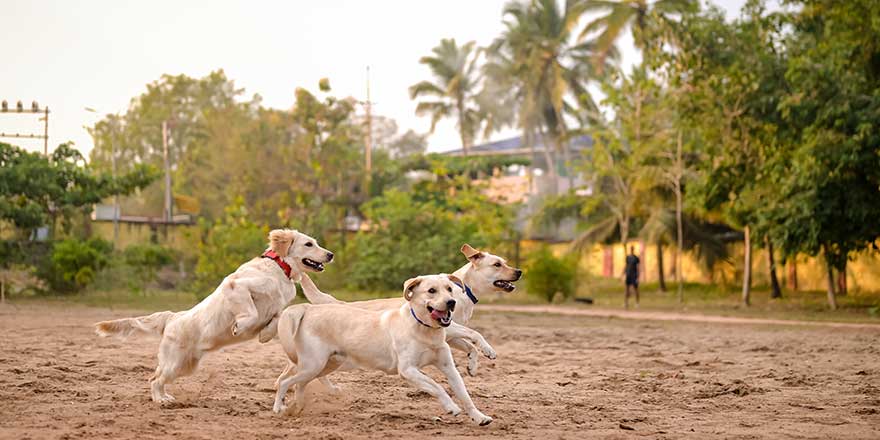
Golden Retriever puppies can seem aggressive, but it’s unlikely that they are actually as aggressive as they may look. The fact is, your puppy is learning all kinds of behavior when they’re young age, and this will include defensive behavior.
You may be watching the litter and see them fighting each other. This, to humans, looks aggressive. But, the dogs are actually just learning how to bite without hurting each other, which is a skill that will greatly benefit them as they grow to be adults. When a dog bites, it can be extremely damaging unless they have learned the power of their bites as puppies. This is one of many reasons puppies should never leave a mother dog or the rest of their littermates early.
It’s highly unlikely that you have a young, aggressive dog unless they haven’t had the proper socialization necessary to live with others. This is another cause of a breeder leaving their litter early or incorrect training. Dogs from backyard breeders often come out of their first home with a lot of bad behavior because they usually don’t understand how to properly raise dogs and are just churning them out for the money.
Before you conclude that you have an aggressive dog, give them a few months to properly develop and be trained.
Can Golden Retrievers Be Aggressive as Puppies?
Golden Retrievers can be aggressive as puppies, but what you’re seeing and labeling “aggressive behavior” could very well just be puppies learning how to be dogs. This happens in the first couple of months before the puppies leave their mother, and the behavior will include a lot of play, fighting, biting, and jumping at each other. This is all perfectly normal.
Now, if your puppy is a little older – say, around 6 months – and they’re still aggressive, there’s a problem. This means that the first dog owner did not allow the puppy to go through the proper socialization process that enables them to learn right and wrong from their mother and littermates. They are also less likely to have been trained beyond using the litterbox.
It is also possible that your young dog has already been traumatized and is not adhering to proper puppy behavior. This can be seen in dogs that come from bad homes, as is often the case with puppy mills that have too many dogs and don’t care about how their personality develops. Your Golden Retriever may have spent the early part of their life not getting enough food, fighting for food, not having their own space, and more.
Unfortunately, puppy mills and backyard breeding are causes of negative behavior in dogs because these abhorrent practices are not regulated, and the dogs are not raised correctly.
Why are Puppies More Aggressive?
As we mentioned, it’s not that they’re more aggressive than adult Golden Retrievers. Puppies spend the early part of their life learning what behaviors are acceptable and which will hurt another.
Unless your puppies are making sounds of distress or actually hurting each other, you can leave them to play fight and bite each other without worrying. The biting that they’re doing is actually teaching them how hard they can bite before they hurt the person or animal they’re biting. They’re listening for each other’s sounds of distress to learn what does and doesn’t hurt.
When do Golden Retrievers Calm Down?
You can expect your Golden Retriever puppy (and most other dog breeds for that matter) to start calming down around 7 months. Male Golden Retrievers can be naturally more aggressive, but even they will stop biting consistently around the 7-month mark.
Poor breeding practices can lead to aggressive Golden Retrievers, and their home life before they reach you may alter the dog’s personality from what it naturally is. Dogs from poor homes may take longer to settle down than dogs that come from a reputable breeder.
As a pet owner, it’s your job to identify problem behaviors in your dog and help them work through their aggression. Use positive reinforcement and dog trainers, and give them the appropriate amount of one-on-one time to help curb aggressive behavior.
What Causes Aggression in Golden Retrievers?
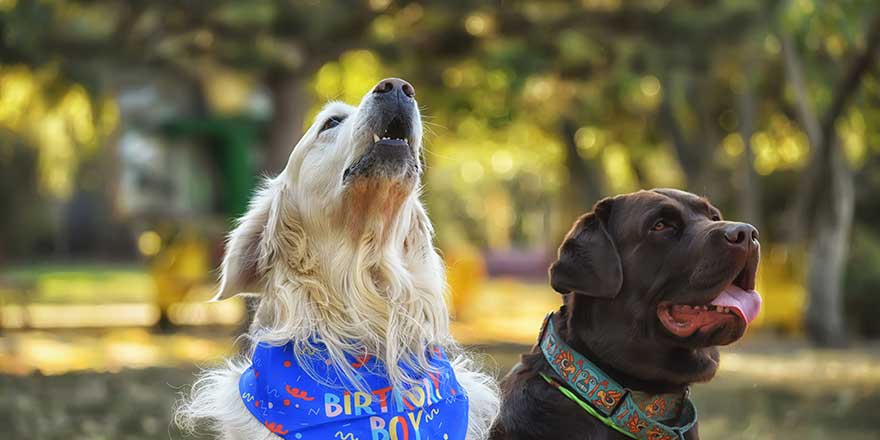
Though we’ve already identified the types of aggression in Golden Retrievers and other breeds, knowing these doesn’t completely help dog parents understand what causes the aggression. It tells you what category of aggression your pup may be experiencing. As such, here is a list of possible causes of aggression that may be affecting your Golden Retriever:
- Fear
- Anxiety (including social anxiety)
- Illness
- Injury
- Frustration
- Food guarding
- Guarding their belongings (bed, bowl, toys)
- Being protective of other dogs or people
- Possessiveness
- Wariness towards other people or dogs
- Trauma triggers
Do Golden Retrievers Bite?
Without being provoked, it’s unlikely that a Golden Retriever will bite a human. Golden Retrievers may “mouth” at you, where they put their open mouth around your hand or arm without using their teeth. This is a form of play biting that they use and is also a way to explore the world. Dogs often use their mouth to explore their environment, including you.
Do Golden Retrievers Attack Humans?
Again, this is another situation brought on by being provoked. Golden Retrievers are an extremely friendly breed who are unlike to display aggressive behavior. If they do decide to attack, it is because they feel unsafe and threatened.
Dogs, as a rule, do not attack for no reason. They attack because they feel they need to defend themselves or have been trained to attack. If your dog is showing aggressive behavior that you believe may lead them to attack you or someone else, seek professional advice from your vet and a qualified dog trainer.
Choosing a Male or Female Golden Retriever
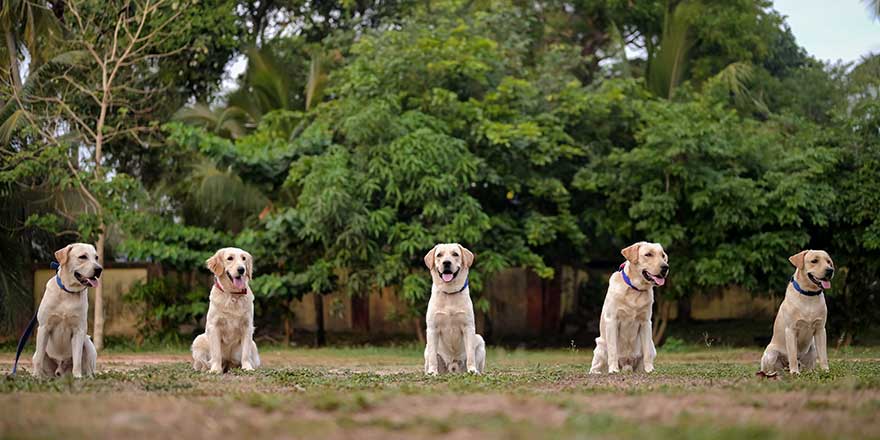
Male dogs can be more territorial, making a Golden Retriever aggressive (or at least seem aggressive), but females can be just as territorial. When choosing a dog, you can take their sex into account, but it isn’t often a huge difference.
Consider the vet bill implications of both sexes and behavioral differences. Though males will fight more, this usually stops after they are castrated. Females go into heat, but males spray – again, which is solved after castration for both sexes.
Male dogs are more affectionate, but females are usually more responsive to training. Female Golden Retrievers are more independent, while males of the breed are more likely to spend time at your side and look to you for guidance.
Remember that, no matter which sex you choose, Golden Retrievers are a large breed and need plenty of food and exercise to stay happy and healthy. They’ll be most at home in a house with a fenced-in garden or a nearby dog park to play in every day.
Adopting a Golden Retriever
Now that you know everything about aggression in the Golden Retriever dog breed let’s discuss finding a reputable breeder or shelter to adopt your new furry friend.
Shelters who pick up aggressive dogs do everything they can to help them before rehoming them. They will work with them to limit Golden Retriever dog aggression, but they are not dog trainers and may not have the resources necessary to curb this kind of behavior. When this is the case, a shelter will attempt to find the dog home with an owner who has experience with aggressive dogs. Occasionally, in the case of very aggressive dogs who do not find homes and have attacked before, they may be put down.
Shelters will warn potential owners of any known issues that a dog has. Shelter dogs are often very nervous initially and may seem aggressive while settling in. Don’t let this deter you or entice you into taking them back. Give the pup some time to explore and get to know you.
As for breeders, you’ll want to find a breeder who has visible online reviews and doesn’t ask for deposits online or before you’ve met the dog. Paying deposits for dogs you haven’t seen or signed anything for is a huge red flag. There are many fake breeders on online marketplaces looking to make quick cash.
Check the American Kennel Club marketplace for reputable breeders registered with the AKC. Golden Retrievers are a category on the marketplace, and breeders list available dogs with their sex, age, photos, and location.
A breeder listed on AKC must go through rigorous guidelines to list their dogs and puppies. It isn’t a case of anyone can list. They must meet the American Kennel Club’s requirements and guidelines to be a breeder and list puppies for sale online.
Frequently Asked Questions
The first port of call for an aggressive dog is always your registered veterinarian. Not all aggressive behavior will be personality or experience-based, some medical conditions can cause a dog's behavior to change suddenly or over time. It's always best to have your pup looked over in case the cause of their behavior is something more serious.
When Golden Retrievers' aggression is getting out of hand, you can book them in with an appropriate dog trainer. This is great if you have multiple Golden Retrievers or other dog breeds at home because the trainer can work with all of your dogs, and not just the one being aggressive. It's not uncommon for owners to mistake a non-aggressive dog for the aggressive one in the family.

